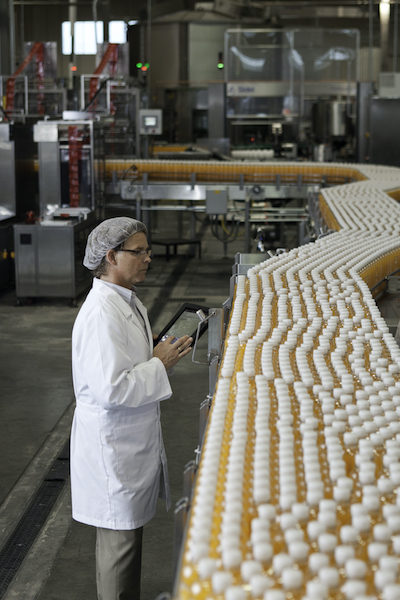Errors are unavoidable in the food production, packaging, and distribution processes due to the number of intricate steps involved. So it comes as no surprise that manufacturers are now resorting to advanced food inspection systems to perform quality checks on food items—this helps avoid human errors and improve the efficiency of food processing.
Machine Vision Systems
Machine vision systems are used to inspect the quality of a wide range of food products, including baked goods and beverages. These machines are outfitted with high-resolution cameras that can detect common food processing and packaging errors.
While inspecting, machine vision systems use neural net technology to determine what is acceptable or unacceptable. This technology provides them with human-like decision-making abilities, and they can easily distinguish a flaw from a natural asymmetry. These machines are programmed to inspect baked goods based on their geometry—they measure each item’s height, width, and length to ensure consistency and detect dimensional errors. The vision machines are also trained to visually separate each product using segmentation tools to maximize counting accuracy. They also have built-in remote support capabilities, allowing them to correct any errors as quickly as possible.
These inspection systems detect labeling errors just as well. Correct labels are an absolute requirement for product distribution. The labels must be completely traceable throughout the supply chain and mention all the allergen-based contaminants. There is a greater focus on product labels because incorrect allergen labeling can cause customer illness and harm the producer’s brand image.
Machine vision systems can also inspect the exteriors of fully decorated beverage cans with ease. These machines have multiple cameras and sophisticated software algorithms that analyze every can in the line. Any print quality or color defect is reported immediately.
Hyperspectral Imaging Systems
Hyperspectral imaging systems, which can capture both spatial and spectral information about products, can inspect the morphology and chemical composition of the products at the same time. These systems have three modes of operation: reflectance, transmission, and transflectance.
Reflectance imaging systems can examine both the surface and subsurface of a product. This makes them ideal for inspecting fruits and vegetables as they are judged by their surface characteristics. Transmission imaging systems, on the other hand, are designed to detect internal product flaws. These systems are ideal for verifying the quality of fish and meat. Because of the spectral difference between the parasite and the flesh of the fish, they can easily detect parasites in fish. Thirdly, transflectance imaging systems can capture light that has been partially transmitted through the products. They are used to obtain spectra from different food samples.
X-ray Systems
X-ray detection has also become a popular method of food inspection lately. Manufacturers can detect foreign materials such as metal, dense plastic, glass, bone, or stone using this dependable and cost-effective method. This method of inspection checks for quality defects in food products and ensures that they are safe for consumption. X-ray inspection systems are especially useful in the dairy processing industry. They are not only designed to detect foreign objects, but they can also measure the thickness of a product and count the items. This system is ideal for inspecting non-uniform products such as Swiss cheese.
X-ray inspection systems are versatile enough to examine all types of food products, whether packaged or unpackaged, slurries or fluids, bulk foods, or canned foods. They can also scan the fill levels to ensure product integrity.
High-resolution lenses are an essential element that contributes to the dependability and efficiency of these inspection systems. These lenses produce high-quality images and videos, allowing for smooth functioning and detection.
Let Universe Kogaku’s lens application engineers provide your optimal lens solution.
Universe Kogaku has a team of skilled engineers who can design and manufacture optical lenses for a variety of industrial applications. If you are a manufacturer of food inspection systems and require high-quality lenses for your machines, please contact us at 1-516-624-2444 or send us an email at info@universeoptics.com for assistance.